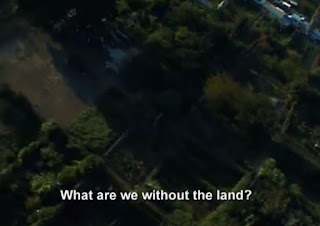From 1992 to 2006, the 14 acres of South Central Farm looked like this:
| Courtesy Mitch Glaser |
 |
| From Google Maps |
When I saw the footage of bulldozers razing the farm, pushing down fruit trees and destroying acres of crops, I cried. Watching that destruction, that waste, that disregard for the community, the brutality of the police breaking the picket line, hurt. The pain of the people who had worked that land for a dozen years was very real to me. From my own tiny parking lot garden, I've learned how much it means to coax fertility from unwelcoming ground. Furthermore, I have relationships with my neighbors that come from being out there watering and digging, and probably connections that I'm not even aware of-- a few weeks ago, three big plastic pots half-filled with dirt appeared in front of my door. I thought my roommate had brought them, only to find out from another neighbor that someone a few doors down had left them for me upon moving out.
So it is hard to think of industrial development as having more real, lasting public good than a parcel of land where people grow things. The 600 jobs that come to the community also come with more traffic from trucks and commuters, adding pollution to to the area. Is "600 hundred jobs" really so much better than "350 families farming"?
In the same month in which the USDA reported a record number of people receiving food stamps, LA City Council missed an opportunity to declare that a place to grow food and community is more important than a place to conduct commerce. Factories and warehouses close and decay when they are no longer profitable or useful to the owners. Poof, jobs--gone. A community garden will last as long as there are hungry people willing to tend it. LA once had the largest community garden in the nation and proved itself once again to be a city with no qualms about destroying what it has built.
I look at the urban gardening movement in Detroit and in the world, and I look at empty lot after empty lot in Los Angeles, corralled by chain-link fences and occupied only by trash and weeds. I wonder what might grow there. I wonder how much more concrete will be poured, how much more asphalt will be spread, before we realize what a woman in the feature-length documentary The Garden said: Try planting on cement. You'll get nothing.
 |
| Screenshot from The Garden |
"It's a pretty simple idea-- land, people, food. Happy days." - Doris Bloch
If only modern politics were that simple. I've joined the South Central Farmers' email list to try to stay updated. Please share any further information around this issue.
No comments:
Post a Comment